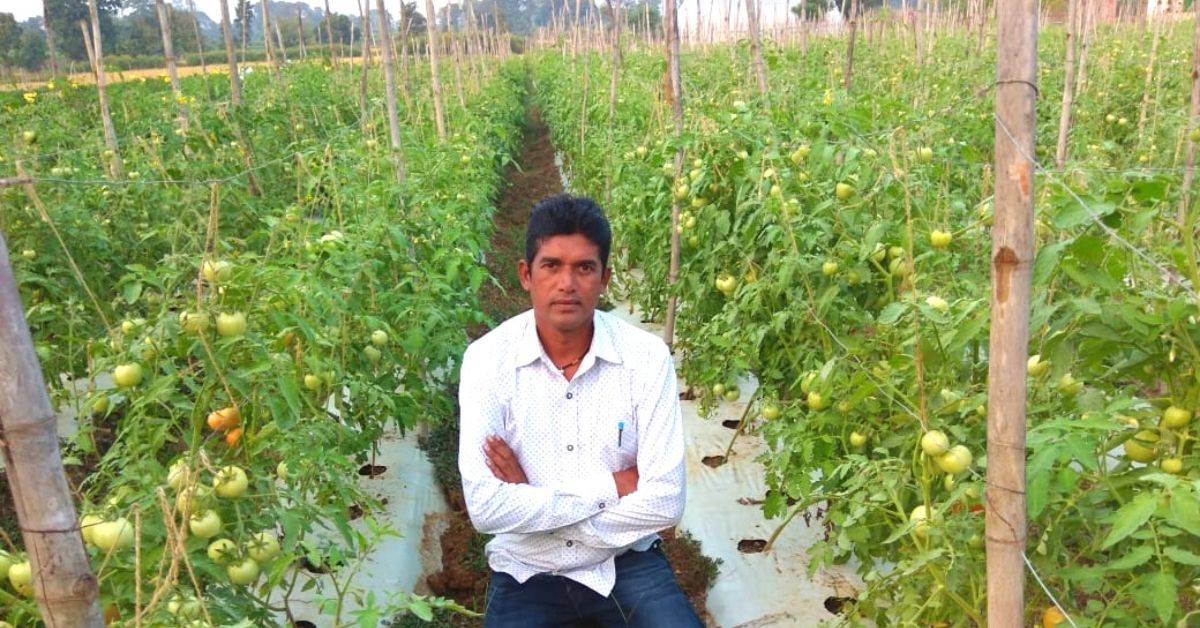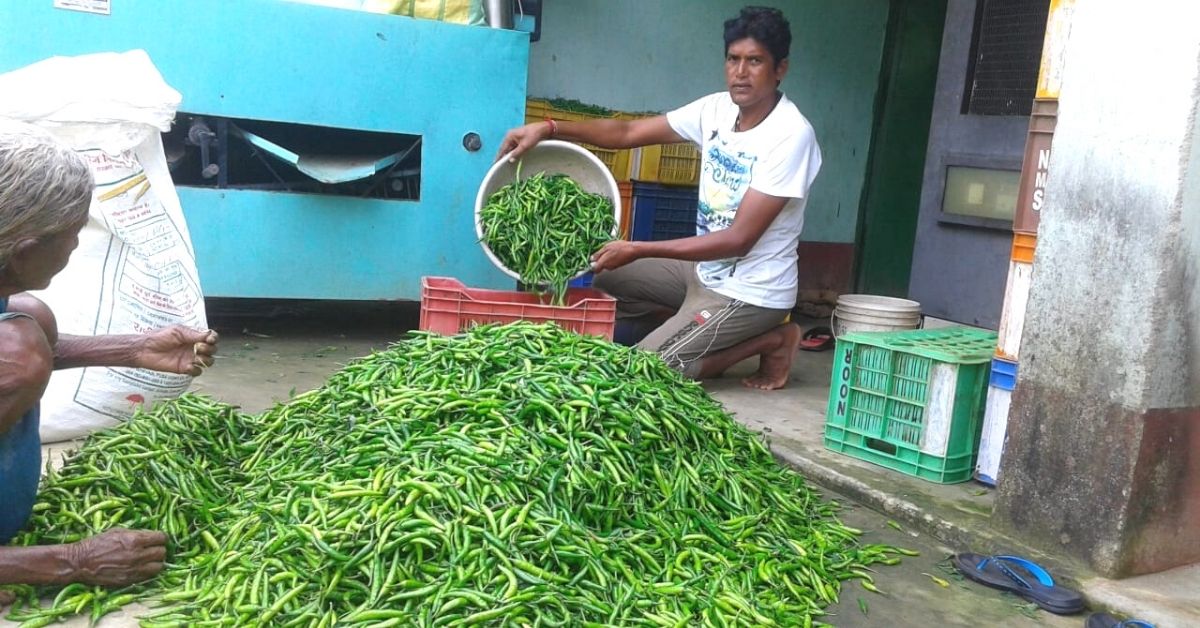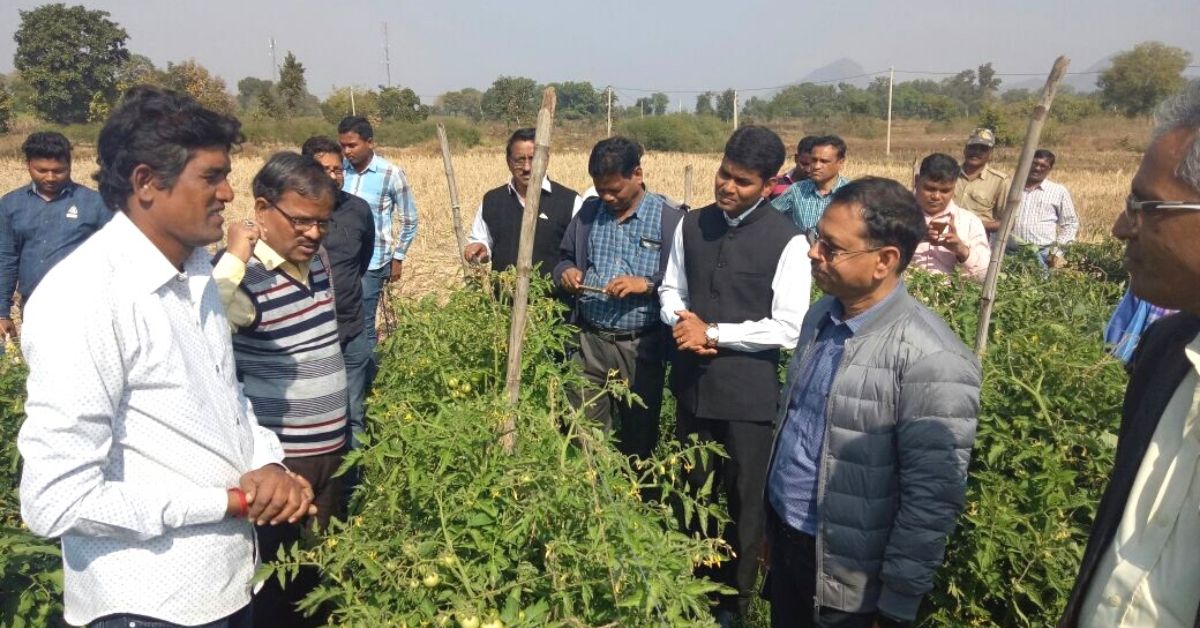Odisha Organic Farmer Earns Rs 18 Lakh/Year, Buy 10 Acres of Farmland With Profits
Krushna Nag from Odisha grows season vegetables and fruits such as mangoes, pomegranates, and bananas using a variety of organic methods

Odisha-based Krushna Nag has always held affection for nature in his heart, he says. He began working as a driver of light and heavy vehicles in 1996, but alongside his work, he’d spend hours admiring little flowers and fruits on trees.
About a decade later, in 2006, Krushna, who is from Kalahandi, began giving his love for nature more serious thought. “I wanted to grow trees,” he simply says. While he continued driving, he also took up planting around 50 mango trees across his 0.25-acre ancestral land.
He says he believed in following organic methods for health reasons as well as low investment costs. In the process, he learned that it would take around four years until his mango trees would mature and bear fruits. In the meantime, he decided to plant tomato and chilli in the space between the mango trees, to experiment with intercropping, and planted coconut trees on the boundaries of the farm.
“My aim was to be able to sustain myself and earn a steady income,” Krushna tells The Better India.
Eventually, the 48-year-old switched to farming entirely. He says he earned Rs 2.6 lakh from his first chilly harvest. Since then, the farmer has steadily increased the size of his land under cultivation to 11 acres, grows a wide range of vegetables and fruits, rears poultry, and practises pisciculture, which collectively earns him Rs 18 lakh a year. Moreover, he has earned kudos from the state Agriculture Department and become an inspiration for hundreds of farmers.
‘They called me crazy’

Krushna says he was impressed with his initial high earnings. “To put better efforts, I pursued training from Horticulture Mission, a state government programme, and learned effective techniques of organic farming and space utility. The tomatoes and chillies I harvested using the methods had a longer shelf life and shone better than the ones grown using chemical fertilisers,” he says.
Feeling inspired, he continued growing vegetables and selling mangoes, bananas, pomegranates and coconuts. He used the earnings to increase his agricultural land gradually, by a quarter of an acre to an acre over the years. But the task was not simple.
“The region has hard soil and is ideal for growing mostly paddy. My grandfather and father called me crazy, and insisted that the lower ground level of the farm was unfeasible for the growth of other vegetables. But I brought more soil and increased the ground level. They thought I was insane for making such changes,” he says.
Krushna says that he and his wife started reaching out to farmers in the region to buy cow dung to prepare organic manure. “It was a humongous task to increase the fertility of the hard soil by organic methods and achieve better productivity. The practice continues today, and we procure cowling from a 30 km radius, making 100 trips a year. We used cans of 20 litres and carried them back on our shoulders to irrigate the farms. As the land area increased, we dug a small well to lift the water via a pump, and channelised the water through canals,” he adds.
To learn better farming practices, Krushna also travelled to Gujarat, Maharashtra, Tamil Nadu, Chhattisgarh and other parts of the country. He tried to understand how the farmers practice agriculture and what the best ways to grow food were. In 2009-10, he learned about drip irrigation and started installing the system to save water in phases.

He constructed two ponds to rear 1,000 fish and set up poultry. Selling the fish, eggs and chicken helped him earn additional income. He also installed a polyhouse, vegetable grading equipment and a drying machine. The overall integrated farming arrangement ensures cash keeps flowing through the year by some means or the other.
Krushna says he harvests about 2,000-3,000 mangoes from the 50 trees. “Each tomato plant produces around 30 kilos of fruits, while a chilli plant provides 7 kilos. The watermelons grow to massive sizes, weighing as much as 12 kilos each. The total earnings come to Rs 6 lakh per acre, out of which Rs 4 lakh are profits,” he adds.
Tomatoes that last two months
Krushna says achieving such feats took years of hard work, and that he sought benefits from government subsidies to create the entire ecosystem. His success reflects in the number of customers, praises from the agriculture department, and how many farmers have been inspired by his work.
Chandramouli Panda, a pharmacist living nearby says, “Krushna is popular in the area for his farming. I read about him in local newspapers and always wanted to visit the farm. One day he came to the store, and I immediately recognised him from the pictures in the newspapers.”
Chandramouli says that he has been sourcing seasonal vegetables and fruits including mango, banana, watermelon from Krushna’s farm since 2016. “Tomatoes from his farm remain fresh for up to two months without refrigeration. His efforts have been commendable and can be seen in the quality of the produce,” he says.
Agriculture officers are equally impressed with his work. “Krushna was the first to introduce high-tech farming such as mulching, drip, and polyhouse in the region. Many farmers are inspired by him and are adopting his methods. Krushna also guides them through every step, including pest control,” says Raghunath Jal, a village agriculture worker with the agriculture department.

Raghunath says Krushna uses drip to provide nutrients to hundreds of trees on his farm. “He emphasises on the use of coco peat and even sources quality seeds from states such as Raipur, Chhattisgarh, and others. He goes the extra mile to receive the desired outcome,” he adds.
Many farmers across the country also pay a visit to his farm. “Some farmers have 500 acres of land and still find interest in travelling and understanding the agriculture practices I have adopted. It feels like a privilege,” Krushna says.
Assistant Agriculture Officer Nihar Naik says farmers should invest in modern technology and progress from traditional farming methods. “Krushna is an ideal example of this, and has displayed an example of high-quality farm produce from minimal investments,” he adds.
Echoing similar sentiments, Krushna says there is no reason farmers should feel afraid of experimenting. “One may fail once or twice. But if the efforts are put in the right direction, a farmer is destined to succeed. It is important to remove negative thoughts and focus on achieving the outcome. It is with sheer determination that I could weave success,” he adds.
Edited by Divya Sethu
If you found our stories insightful, informative, or even just enjoyable, we invite you to consider making a voluntary payment to support the work we do at The Better India. Your contribution helps us continue producing quality content that educates, inspires, and drives positive change.
Choose one of the payment options below for your contribution-
By paying for the stories you value, you directly contribute to sustaining our efforts focused on making a difference in the world. Together, let’s ensure that impactful stories continue to be told and shared, enriching lives and communities alike.
Thank you for your support. Here are some frequently asked questions you might find helpful to know why you are contributing?


This story made me
-
97
-
121
-
89
-
167











